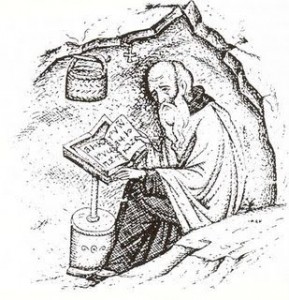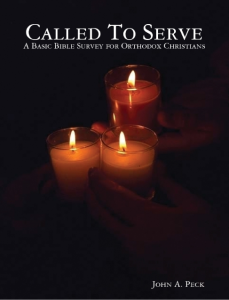by Fr. John A. Peck
The following questions have been submitted to me privately by email or chat.
Should I read in the morning or evening?
 Good question – here’s the answer. When do you normally say your prayers? Read the Epistle and Gospel as a part of your rule of prayer? I would try to fit it in at that time. It really doesn’t matter – select the best time for you and a time when, for the next 100 days, you can be relatively consistent at. I do my Scripture reading in the evening for the next day, usually, and if you are going to read in the evening, I strongly recommend that you read the next day’s selection. That usually works best.
Good question – here’s the answer. When do you normally say your prayers? Read the Epistle and Gospel as a part of your rule of prayer? I would try to fit it in at that time. It really doesn’t matter – select the best time for you and a time when, for the next 100 days, you can be relatively consistent at. I do my Scripture reading in the evening for the next day, usually, and if you are going to read in the evening, I strongly recommend that you read the next day’s selection. That usually works best.
Should I have my children read with me?
 Good question – here’s the answer. I am the father of three sons, and now a grandfather, so with 30 years of parenting under my belt you can believe me when I say – you can do what you want, but you really don’t want to do that. This isn’t like reading a bedtime story. This is study. It’s boring for kids. It will take you away from them for at least an hour a day. Your job, if I may suggest it, is to pass along your knowledge and love of the Scriptures to them. This is work, and a significant challenge. I do not recommend adding to the difficulty by including your children Now, if you have a young teen or young adult that would like to join you, that is possible, but then it is really on you to complete what you start. It’s 100 days of Bible reading. You will be the one to keep things on schedule and on task, so count the cost before you wade into those waters. If you do, what a delight!
Good question – here’s the answer. I am the father of three sons, and now a grandfather, so with 30 years of parenting under my belt you can believe me when I say – you can do what you want, but you really don’t want to do that. This isn’t like reading a bedtime story. This is study. It’s boring for kids. It will take you away from them for at least an hour a day. Your job, if I may suggest it, is to pass along your knowledge and love of the Scriptures to them. This is work, and a significant challenge. I do not recommend adding to the difficulty by including your children Now, if you have a young teen or young adult that would like to join you, that is possible, but then it is really on you to complete what you start. It’s 100 days of Bible reading. You will be the one to keep things on schedule and on task, so count the cost before you wade into those waters. If you do, what a delight!
What about marking up my Bible?
 Good question – here’s the answer. If it helps you get back to passages, ideas, and verses you need to be able to find – do it! I’m not against highlighting, underlining or otherwise marking Bibles for future reference. I’m a visual learner myself; when I remember a Bible verse, I literally remember which side and where on the page I saw it. My only request, for your own sake, is that if you do mark up your Bible, do it neatly. Get a ruler or other straight edge so you can quickly, and very neatly, highlight the verses you need to. You’ll thank me later if you do.
Good question – here’s the answer. If it helps you get back to passages, ideas, and verses you need to be able to find – do it! I’m not against highlighting, underlining or otherwise marking Bibles for future reference. I’m a visual learner myself; when I remember a Bible verse, I literally remember which side and where on the page I saw it. My only request, for your own sake, is that if you do mark up your Bible, do it neatly. Get a ruler or other straight edge so you can quickly, and very neatly, highlight the verses you need to. You’ll thank me later if you do.
How are we to interpet what we read? Are they allegorical stories? Did they really happen?
 Good question – here’s the answer. Those of you who have purchased Called To Serve: A Basic Bible Survey, or Interpreting the Bible the Orthodox Way know that we follow a clear, traditional, patristic and universally understood method of interpretation. It was taught by the fathers, and explicitly defined by St. John Cassian, among others. We read and interpret the Bible in exactly the same way they did. This allows us to keep the mystery of the faith with a clear conscience, and be attentive to the study of the Scriptures themselves.
Good question – here’s the answer. Those of you who have purchased Called To Serve: A Basic Bible Survey, or Interpreting the Bible the Orthodox Way know that we follow a clear, traditional, patristic and universally understood method of interpretation. It was taught by the fathers, and explicitly defined by St. John Cassian, among others. We read and interpret the Bible in exactly the same way they did. This allows us to keep the mystery of the faith with a clear conscience, and be attentive to the study of the Scriptures themselves.
If you wish to dive deeper into subjects like how to understand Genesis properly, then you should read and study a book like Genesis, Creation, and Early Man, by Fr. Seraphim Rose.
Likewise, Preachers Institute has covered this in some of our articles in the past.
AND this one is a must read, Adam, Ralph, Moses and Man, by Fr. Patrick Reardon.
